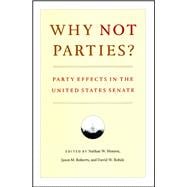
Note: Supplemental materials are not guaranteed with Rental or Used book purchases.
Purchase Benefits
What is included with this book?
| Acknowledgments | p. vii |
| Introduction: Assessing the Impact of Parties in the U.S. Senate | p. 1 |
| Electoral Accountability, Party Loyalty, and Roll-Call Voting in the U.S. Senate | p. 23 |
| Party and Constituency in the U.S. Senate, 1933-2004 | p. 39 |
| Scoring the Senate: Scorecards, Parties, and Roll-Call Votes | p. 52 |
| The Senate Whip System: An Exploration | p. 73 |
| Party Loyalty and Discipline in the Individualistic Senate | p. 100 |
| Make Way for the Party: The Rise and Fall of the Senate National Security Committees, 1947-2006 | p. 121 |
| Agenda Influence and Tabling Motions in the U.S. Senate | p. 142 |
| Filibustering and Majority Rule in the Senate: The Contest over Judicial Nominations, 2003-2005 | p. 159 |
| Minority-Party Power in the Senate and House of Representatives | p. 181 |
| Catch-22: Cloture, Energy Policy, and the Limits of Conditional Party Government | p. 198 |
| Distributive and Partisan Politics in the U.S. Senate: An Exploration of Earmarks | p. 229 |
| References | p. 253 |
| Contributors | p. 271 |
| Index | p. 275 |
| Table of Contents provided by Ingram. All Rights Reserved. |
The New copy of this book will include any supplemental materials advertised. Please check the title of the book to determine if it should include any access cards, study guides, lab manuals, CDs, etc.
The Used, Rental and eBook copies of this book are not guaranteed to include any supplemental materials. Typically, only the book itself is included. This is true even if the title states it includes any access cards, study guides, lab manuals, CDs, etc.